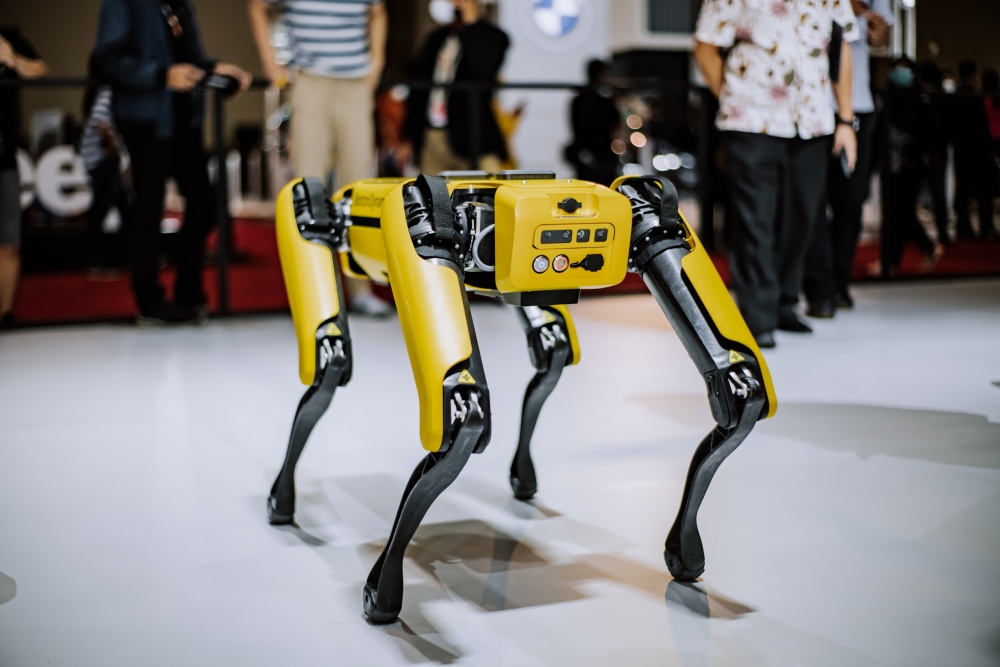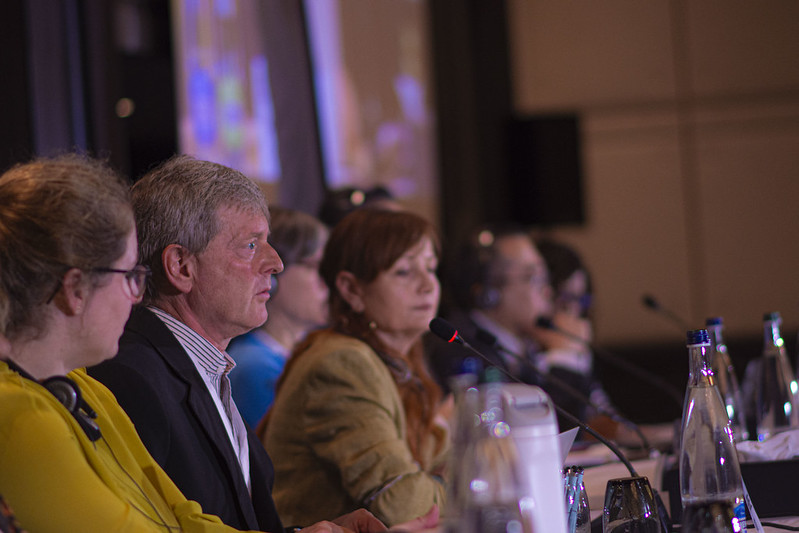8 April, 2025“Artificial Intelligence is not in the distant future; it is already shaping the present. The question is whether workers will have a say in how it shapes their future,” says Kan Matsuzaki, assistant general secretary, IndustriALL Global Union.
Not long ago, a shipyard introduced a new assistant to improve safety. It was not a human colleague, but a robot called “Spot”, an AI-powered tool capable of patrolling work areas, detecting gas leaks invisible to the human eye and monitoring heavy equipment.

Jakarta, Indonesia, 04 09 2022 : Yellow robot dog, suitable for industrial detection and remote operation. Mini robot guard Spot. Shutterstock Hendra Yuwana
What set this deployment apart was the process behind it: the union was actively involved. Workers were consulted. Concerns were acknowledged. In this case, technology was shaped to serve people, not to replace or disempower them.
This is what we mean when we speak of a Just Transition. It is not about rejecting innovation, but about ensuring that innovation is aligned with rights, safety and human dignity.
Across our global network of affiliates, we are hearing concerns about the introduction of AI, often without dialogue, safeguards or accountability. Algorithmic management, digital surveillance and data-driven performance tracking are no longer theoretical, they are already changing work. And too often, they do so in ways that blur the line between efficiency and exploitation.
These effects carry significant consequences. Women remain underrepresented in AI-related employment and the systems themselves frequently mirror and reinforce existing inequalities. One study found that 44 per cent of AI systems showed gender bias, while a quarter exhibited both gender and racial bias. In many low-income countries, only 20 per cent of women have internet access. This is not just a digital divide; it is a structural exclusion from the economy of the future.
Unions must not only demand gender-aware AI systems, but also actively support pathways for women and gender-diverse workers to access digital and technical roles. If AI is allowed to evolve in a space where women are absent, the inequalities will be built into its code.
At its core, this is about more than technology. It is about governance, inclusion and accountability. Who will shape the rules? Who will benefit from the wealth AI generates? And who will carry the costs?
"These are fundamental trade union questions."
At IndustriALL, we are responding with care and commitment. I lead our Industry 4.0 Expert Group, which brings together affiliates, experts and youth representatives to develop a comprehensive policy framework on AI. Our approach is grounded in lived realities: we are listening to workers, gathering evidence from our affiliates and prioritizing five key areas, algorithmic transparency, skills development, occupational health and safety, redistribution of wealth and organizing power.

EXCO Geneva 2024
In 2024, our Executive Committee began its first strategic debate on AI. In June 2025, our Executive Committee will debate and adopt IndustriALL’s global AI policy. This will be a landmark moment, not just for our organization, but for every worker facing the uncertainties of algorithmic change. We are also holding youth forums, advancing gender equity in digital transformation and identifying concrete union strategies that have already delivered results. This is about ensuring that workers are not simply observers in the AI transition, but active participants and co-creators of its outcomes.
Reflecting on my own country, Japan, I sometimes wonder why the AI conversation feels so different there. After being away for over 14 years, I notice that Japan has quietly and steadily integrated AI technologies into daily life. While companies don’t adopt new tech at lightning speed, they seem to engage with society more deliberately, cultivating public trust and social consensus around these changes. Today, Japan has one of the lowest unemployment rates in the world, less than 3 per cent, and hasn’t experienced the same kind of AI disruption felt elsewhere.
This may also be shaped by Japan’s aging population and shrinking workforce, which creates both pressures to automate and societal acceptance of supportive technologies, especially in care, logistics, and service sectors.
Is this due to cultural pace, structural caution, demographic realities, or a deeper integration of social values into technological change? I don’t have the answer yet. But I believe it holds important lessons for how we approach the AI transition globally, with intention, inclusion, and a steady hand.
If you are a trade unionist wondering how to respond to AI, I want to reassure you: the labour movement has faced moments of intense transformation before. From the age of industrialization to the digital era, our strength has always been our ability to organize, to demand fairness and to place human values at the heart of industrial change.
AI should not be a new force that decides your future without your knowledge or consent. It must be negotiated. It must be transparent. And it must be implemented with human dignity as a non-negotiable principle.
We cannot afford to wait until job losses accelerate, gender gaps widen, or decisions are made beyond the reach of democratic input. The time to act is now, through collective bargaining, through social dialogue and through renewed global solidarity.
Let us bring the same clarity of purpose and collective strength to this new frontier.
Because while AI may be driven by data, its impact is deeply human. Let us ensure that in this next chapter of industrial change, no worker is left behind.


